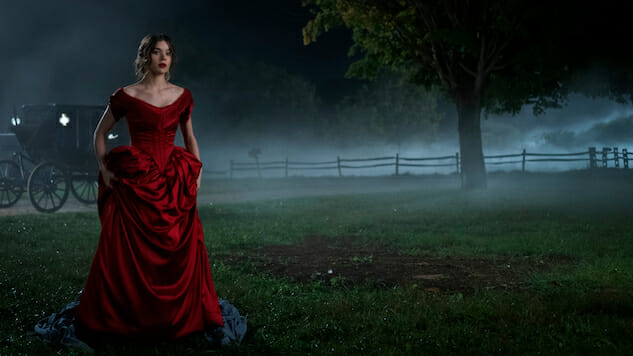Dickinson Is a Rapturously Anachronistic Coming-of-Age Ecstasy Trip of a Period Piece
Thanks, we love it.
Photo Courtesy of Apple TV Reviews Dickinson
I originally had an entirely different working lede for this piece, but then I got to a scene so viscerally hilarious and specific late in the last of the three episodes of Dickinson provided for review (“Wild nights”) that I was obliged to drop everything I was doing and dive down the long rabbit hole of the Internet to figure out exactly when the word “period” entered the general lexicon as a colloquialism for menstruation.
The answer, it seems, is sometime between 1822 and 1879—that is, exactly during the period (!) that Emily Dickinson would have been most personally concerned with the subject. But where that exercise in lexical sleuthing would have been—for other, more traditional period pieces (!!)—undertaken purely in the service of basic fact-checking, here with the word period making its appearance in between scenes of a pre-Civil War Amherst house party getting lit on opium and turnt to “I Like Tuh” by Carnage (feat. I LOVE MAKONNEN), the goal was to simply regain my meta-narrative bearings. That is to say, what I needed to do was figure out if the use of period—already acting in its scene as a punchline of sorts—was meant to be a stylistic flourish in the same anachronistic vein as Lavinia’s (Anna Baryshnikov) double-handed pumping of the sign of the horns when the Dickinson siblings made plans for said house party in the first place (no), or if it was one of the many period-(!!!)-specific details that keep the raving ghost of Dickinson from flying entirely off the rails (yes).
At this point, it makes sense to circle back to my original lede, which was: Despite all the mystery surrounding her long, hermetic life, it’s hard to imagine that the real Emily Dickinson (she of the poetic syntax so wildly removed from the style of her time that it wasn’t until 1955 that publishers stopped editing all her linguistic ecstasies into comparatively dull normalcy), wouldn’t get a kick out of Dickinson, Alena Smith and Hailee Steinfeld’s lovingly weird imagining of the poet’s young adulthood. Dickinson is so fun and so strange and so tireless in handing out little moments of character development, with wildly original mood setting, you could watch thousands of hours of television and still not think to expect, of course, the Dickinson who scrawled out “Wild nights – Wild nights!” and left behind thousands of scraps of genius in a locked chest would dig it.
To be clear, this is not me saying that rapturous anachronisms of Dickinson will be to everyone’s taste. Would Emily’s parents, in reality or as played here by Toby Huss and Jane Krakowski, be into it? Nah. Emily’s peers? Sue (Ella Hunt)—yes. George (Samuel Farnsworth)—yes. Everyone else—it depends. You? Who’s to say! Death showing up in the guise of Wiz Khalifa in a black silk top hat inside a ghostly black carriage to take Emily (Steinfeld) away from the funeral of her bosom friend/true love Sue’s last remaining sister (as Billie Eilish’s “bury a friend” pulses underneath the dialogue almost too quiet to hear) will read to many as try-hard poptimist-adjacent gimmick, and it feels likely that Apple is trying to buy the affections of a Gen Z audience through clout rather than substance. But.
But. While it’s always a high-wire balancing act for any project to try to weave contemporary language, music, and mannerisms into what is otherwise a fairly accurate period piece, it makes unique sense for Dickinson (whose story is explicitly about a woman whose weirdo passions and explosive inner world transcend the time she was born into) to do that kind of translation, making what might otherwise be foreign about the tensions native to Emily’s daily life unavoidably legible to a modern audience.
That is, Alena Smith and her team aren’t using slang and fist bumps and Wiz Khalifa cameos to be Cool; they’re using them to communicate something critical about Emily Dickinson’s place in the arc of American history. (And also, honestly, the fact that people have been weird and wild and dumb and young forever, even in the Victorian era, even if they weren’t Emily Dickinson, as this adorable photoset of a laughing Victorian couple demonstrates.) The story of being Emily is anchored to one point in time; the story of being human is timeless. So why not throw a rager?
Of course, where Dickinson ends up is an open question. With only three episodes provided for review and all of Emily’s real, long life such a legit mystery, it’s difficult to gauge what the central arc of the whole season might be. But with such gorgeous cinematography, costuming, and metatextual design, and with every actor putting in such fun, charming, deeply specific (read: often deeply odd) performances—and with Smith and Steinfeld, especially, so blazingly self-confident in their vision—it seems entirely likely that Dickinson will be one of the brightest debuts of 2019. I genuinely want to be shut up in the prose of its walls, for as long as Emily will have me.
Dickinson premieres Friday, November 1st on Apple TV+.
Check out our reviews of the rest of Apple TV+’s inaugural programs below:
Alexis Gunderson is a TV critic and audiobibliophile. She can be found @AlexisKG.